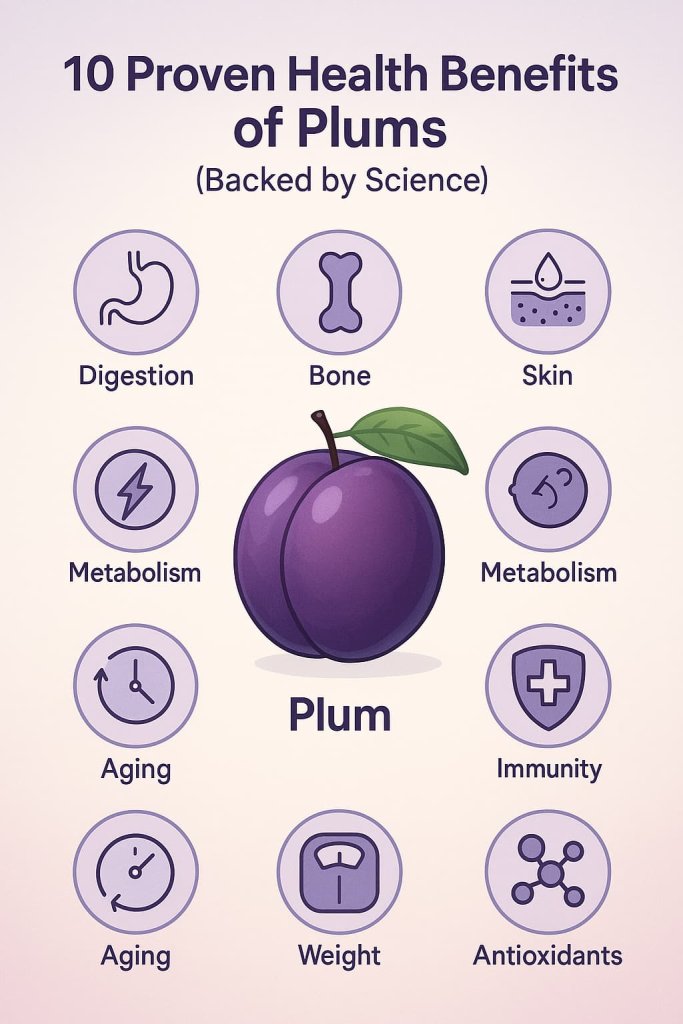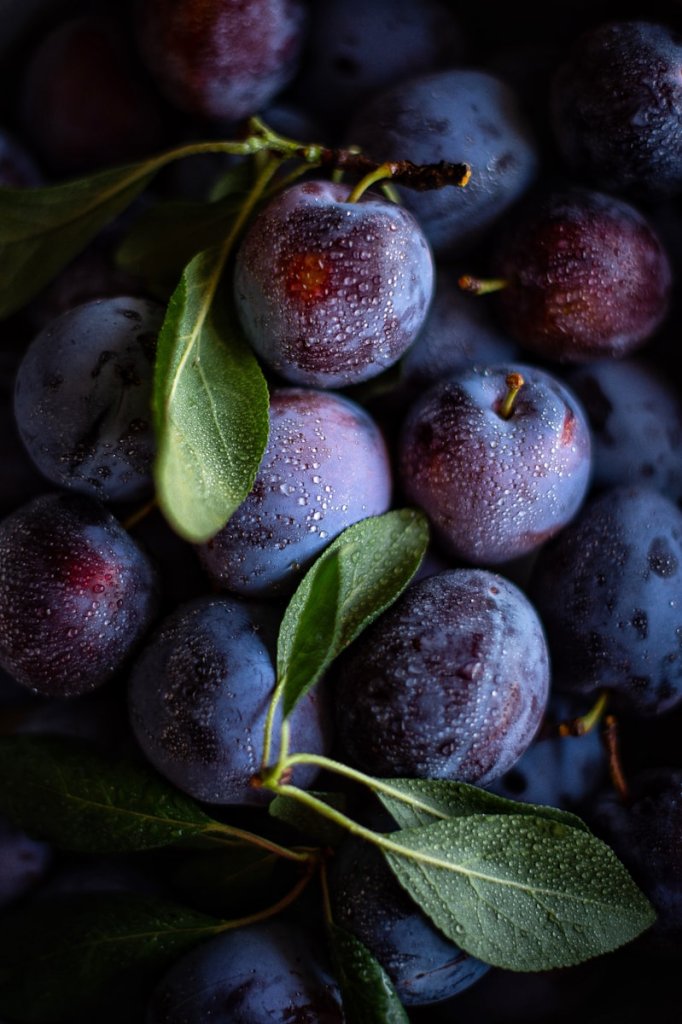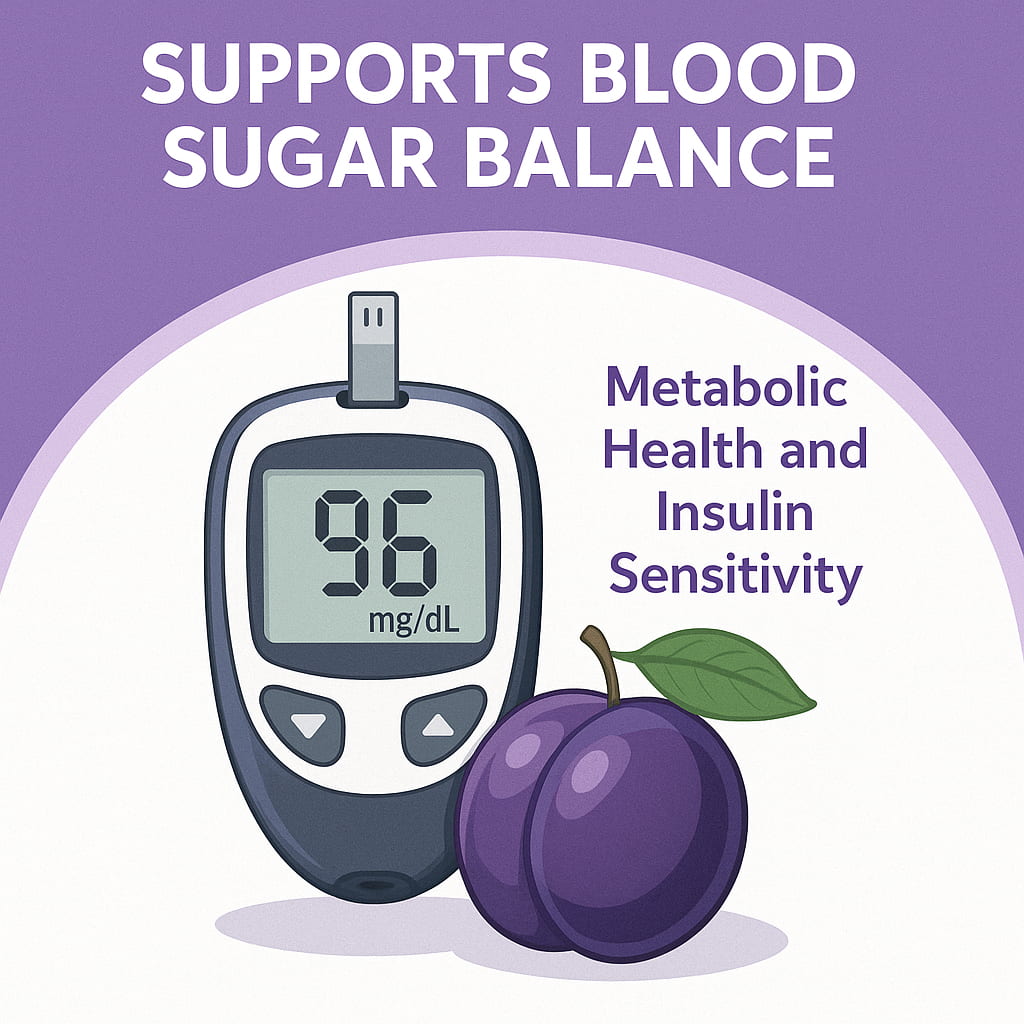Plums are nutrient-rich fruits that may help support digestion, bone health, heart function, and immune balance.
Loaded with antioxidants, vitamins, and fiber, these juicy fruits offer a wide range of benefits that contribute to overall wellness. Understanding how plums fit into a balanced diet can help you make smarter choices for long-term health and vitality.

What Makes Plums So Healthy?
Plums (Prunus domestica) are small, juicy fruits that pack an impressive combination of vitamins, minerals, fiber, and plant compounds beneficial for overall wellness. Available in a variety of colors—purple, red, yellow, or green—plums are not only naturally sweet but also rich in antioxidants and hydrating due to their high water content.
They are low in calories yet nutrient-dense, making them an ideal fruit for supporting digestion, metabolism, and heart health. Both fresh plums and dried plums (prunes) offer unique wellness benefits. Fresh plums are great sources of vitamin C and hydration, while prunes provide higher concentrations of fiber, potassium, and polyphenols.
Nutritional Profile of Plums (per 100 g)
(Source: USDA FoodData Central, 2024)
| Nutrient | Amount | % Daily Value* |
|---|---|---|
| Calories | 46 kcal | — |
| Carbohydrates | 11.4 g | — |
| Fiber | 1.4 g | 5% |
| Sugars | 9.9 g | — |
| Protein | 0.7 g | 1% |
| Vitamin C | 9.5 mg | 10% |
| Vitamin K | 6.4 µg | 5% |
| Vitamin A | 345 IU | 7% |
| Potassium | 157 mg | 4% |
| Antioxidants | Rich in polyphenols and anthocyanins | — |
*% Daily Values are based on a 2,000-calorie diet.

Why it matters for wellness:
Plums support multiple aspects of health thanks to their balanced nutrient profile.
- Vitamin C aids immune function and collagen production.
- Vitamin K and potassium contribute to bone and cardiovascular health.
- Antioxidants such as anthocyanins and phenolic acids help combat oxidative stress that contributes to aging and chronic disease.
- Dietary fiber and sorbitol promote digestive regularity.
Incorporating plums into your daily diet is an easy, evidence-based way to add natural sweetness, hydration, and vital nutrients that support long-term wellness and healthy aging.
10 Proven Health Benefits of Plums (Backed by Science)
Plums are juicy, nutrient-dense fruits that may support digestion, heart health, and bone strength while providing powerful antioxidants. Backed by scientific research, they are a simple and delicious addition to any wellness-focused diet.
1. Supports Digestive Health

Plums and prunes are well-known for their natural ability to support healthy digestion. They contain dietary fiber, sorbitol (a natural sugar alcohol), and phenolic compounds, which collectively promote bowel regularity and help nourish the gut microbiome.
A clinical study published in Alimentary Pharmacology & Therapeutics found that prunes improved stool frequency and consistency more effectively than psyllium fiber in adults with mild constipation. This digestive benefit is linked to their combined content of soluble fiber and natural sorbitol, which softens stool and enhances motility.
Tip: Eating 2–3 fresh plums or 4–5 dried prunes daily may help maintain normal digestion and gut health.
Authoritative sources:
Healthline – Benefits of Plums and Prunes
Cleveland Clinic – Benefits of Plums
2. May Support Bone Health

Scientific research suggests that dried plums (prunes) may help preserve bone mineral density, particularly in postmenopausal women, due to their unique nutrient and antioxidant profile.
A 2023 study published in the Journal of Nutritional Biochemistry found that women who consumed 5–6 prunes daily showed reduced bone resorption markers and improved bone formation.
Plums provide vitamin K, potassium, and polyphenols, which support bone metabolism and reduce inflammation in bone tissue.
Key nutrients involved:
- Vitamin K – supports calcium utilization and bone mineralization
- Potassium – helps reduce calcium loss through urine
- Polyphenols – combat oxidative stress in bone tissue
Authoritative sources:
NIH Office of Dietary Supplements – Vitamin K Fact Sheet
3. Rich Source of Antioxidants

Plums are exceptionally rich in polyphenols and anthocyanins, antioxidants that protect cells from oxidative stress—a factor that contributes to inflammation and chronic disease.
A 2022 study in Food Chemistry confirmed that plum extracts reduced oxidative damage and improved antioxidant enzyme activity in human cell models.
Their deep purple skin contains the highest antioxidant concentration, making whole plums a potent addition to your daily diet.
Including plums regularly may support your body’s natural defense against free radicals, promoting cellular and metabolic health.
4. Supports Heart Health

Plums are a heart-friendly fruit thanks to their potassium, fiber, and polyphenols, which help maintain healthy blood pressure and cholesterol levels.
A 2021 study published in Clinical Nutrition reported that people who consumed prunes daily for eight weeks showed significant reductions in LDL cholesterol and improved total cholesterol profiles compared to a control group.
How it supports heart health:
- Potassium helps balance sodium levels, supporting healthy blood pressure.
- Polyphenols help prevent oxidation of LDL (“bad”) cholesterol, improving arterial health.
- Soluble fiber aids cholesterol management by reducing its absorption.
Authoritative sources:
American Heart Association – Healthy Eating for Heart Health
Cleveland Clinic – Benefits of Plums
5. Supports Blood Sugar Balance

Despite their sweet taste, plums have a low glycemic index (GI ≈ 35), meaning they’re less likely to cause rapid increases in blood sugar.
Their fiber, sorbitol, and polyphenols slow carbohydrate digestion and may improve insulin sensitivity.
A 2023 review published in Nutrients Journal found that plum polyphenols can enhance glucose metabolism and protect pancreatic beta cells from oxidative damage.
This makes plums a smart fruit choice for people aiming to maintain healthy blood sugar levels.
6. Promotes Skin Health

Plums are an excellent source of vitamin C, an essential nutrient that supports collagen production and helps protect skin from oxidative stress and UV damage.
Their anthocyanins and phenolic acids may help improve skin elasticity and hydration, contributing to a smoother, radiant appearance.
Tip: Add fresh plums to smoothies, salads, or yogurt bowls for a vitamin C and antioxidant boost that supports natural skin health.
Authoritative source:
Harvard T.H. Chan School of Public Health – Vitamin C
7. May Support Brain and Memory Function

Emerging research suggests that plum polyphenols may support cognitive function and memory by reducing neuroinflammation and enhancing cerebral blood flow.
A 2022 study in the Journal of Medicinal Food found that older animals given plum extract performed better in learning and memory tests, attributed to improved antioxidant activity in the brain.
While more human studies are needed, including antioxidant-rich fruits like plums in your diet supports overall brain and nervous system wellness.
8. Helps Maintain a Healthy Weight

Plums are naturally low in calories (about 30 kcal per fruit) but high in fiber and water, making them a satisfying snack that can promote fullness and reduce overeating.
A 2021 study in Nutrition Research reported that adults who consumed prunes daily experienced improved appetite control without weight gain.
Their fiber helps regulate digestion and reduce hunger hormones, supporting healthy weight management when part of a balanced diet.
Replacing high-sugar snacks with plums is a simple, sustainable way to improve diet quality.
9. May Support Immune Function

The vitamin C and polyphenols in plums play vital roles in supporting immune function. Vitamin C helps maintain the integrity of epithelial barriers (the body’s first defense against pathogens), while antioxidants reduce chronic inflammation that can weaken immune response.
According to the National Institutes of Health (NIH), adequate vitamin C intake is associated with reduced risk of infections and faster recovery from illness.
Adding plums to your daily meals can help support your immune resilience naturally.
Authoritative source:
NIH – Vitamin C Fact Sheet for Health Professionals
10. May Support Healthy Aging

Oxidative stress contributes to cellular aging, and plums are rich in antioxidants that help protect cells from this damage.
Their unique blend of vitamin C, vitamin K, and anthocyanins supports collagen integrity, bone strength, and vascular health—all important factors for healthy aging.
A diet rich in antioxidant fruits like plums may help maintain skin elasticity, muscle strength, and cognitive function over time.
Possible Side Effects and Precautions (Safety & Compliance)
While plums are safe and nutritious for most people, certain individuals should be mindful of how they consume them—especially those with digestive sensitivities, blood sugar concerns, or specific medication requirements.
This section provides a balanced, evidence-based overview to ensure safe and informed consumption, following YMYL (Your Money or Your Life) standards.
Safety Overview
| Concern | Description | Guidance |
|---|---|---|
| Digestive Sensitivity | Plums and prunes are rich in sorbitol, a natural sugar alcohol that can act as a mild laxative. Overconsumption may lead to bloating, gas, or loose stools in sensitive individuals. | Start with small portions (2–3 fresh plums or 4–5 prunes daily) and monitor tolerance before increasing intake. |
| Sugar Content | Dried plums (prunes) contain concentrated natural sugars and calories compared to fresh plums. | If you’re managing blood sugar or watching calories, limit portions and choose fresh plums more often. |
| Medication Interactions | Plums provide vitamin K, which plays a role in blood clotting and may interfere with anticoagulant medications such as warfarin. | Keep your vitamin K intake consistent and consult your healthcare provider before making dietary changes. For accurate information, refer to the NIH Office of Dietary Supplements – Vitamin K Fact Sheet. |
| Allergic Reactions | Rare, but possible in those allergic to stone fruits (such as peaches, cherries, or apricots). | Stop consumption immediately if you experience rash, swelling, or itching, and seek medical advice if symptoms persist. |
| Food Safety | Like all fresh produce, plums can carry bacteria or pesticide residues if not properly cleaned or stored. Improper storage can also lead to mold growth or spoilage. | Rinse plums thoroughly under running water before eating. Store ripe or cut plums in the refrigerator at or below 40 °F (4 °C) and consume within 3–5 days. For detailed handling guidance, visit the FDA – Selecting and Serving Produce Safely. |
Key takeaway:
Plums are safe for daily consumption when enjoyed in moderation as part of a balanced diet. Individuals with medical conditions, digestive disorders, or those on medications like blood thinners should consult a healthcare provider before making significant dietary changes.
By following FDA food safety practices and NIH nutrition recommendations, you can confidently enjoy plums while minimizing potential risks.
How to Eat Plums for Best Results (Practical & Actionable)
Plums are versatile, delicious, and easy to include in your daily diet. Here’s how to get the most nutritional value while keeping safety in mind.
Recommended Serving Sizes
- Fresh plums: 1–2 medium fruits (about 150–200 g) per day.
- Dried plums (prunes): 4–5 pieces (about 40 g) per day for digestion and bone support.
Best Ways to Enjoy
- Fresh: Eat as a snack or slice into salads, yogurt bowls, or oatmeal.
- Dried (Prunes): Ideal for smoothies, baking, or as a natural sweetener in sauces.
- Smoothies: Blend plums with Greek yogurt, chia seeds, and a drizzle of honey for a fiber-rich drink.
- Cooking: Use chopped plums in chutneys, jams, or roasted alongside poultry for natural sweetness.
Storage & Handling
Store unripe plums at room temperature until slightly soft for the best flavor. Once ripe, refrigerate at or below 40 °F (4 °C) to preserve freshness and nutrients for up to 3–5 days. Always rinse plums under running water just before eating to remove dirt and pesticide residues. Avoid leaving cut or ripe plums at room temperature for more than 2 hours, as bacteria can multiply quickly. Store dried plums (prunes) in an airtight container in a cool, dark place.
For official guidance, see the FDA – Selecting and Serving Produce Safely.
Frequently Asked Questions (FAQs)
1. Are plums good for digestion?
Yes. Their fiber and sorbitol content may help support bowel regularity and overall gut health.
2. Can people with diabetes eat plums?
Yes, in moderation. Fresh plums have a low glycemic index (around 35), making them suitable for balanced blood sugar control.
3. Are dried plums (prunes) better than fresh plums?
Prunes contain more fiber and antioxidants per serving but also more sugar. Both forms offer distinct health benefits.
4. How many plums should I eat daily?
1–2 fresh plums or 4–5 prunes per day is generally considered beneficial for most healthy adults.
5. Are plums safe during pregnancy?
Yes, when consumed in normal food amounts. They supply vitamin C, potassium, and fiber that support maternal nutrition and prevent constipation.
6. Can eating too many plums cause side effects?
Yes. Overconsumption may lead to mild digestive upset or diarrhea due to sorbitol.
7. How can I add plums to my diet easily?
Include them in smoothies, salads, oatmeal, or as a topping for yogurt to naturally boost fiber and antioxidants.
Conclusion
Plums are a nutrient-dense, antioxidant-rich fruit that supports digestion, bone strength, heart function, and immune balance. Their combination of vitamins C and K, potassium, and polyphenols makes them an excellent addition to a healthy, balanced diet.
By enjoying plums regularly—whether fresh or dried—you can naturally boost your daily intake of fiber, hydration, and essential nutrients that contribute to long-term vitality and wellness.
References
FDA – Selecting and Serving Produce Safely
Official FDA guide on washing fruits, preventing cross-contamination, and storing produce safely at or below 40 °F (4 °C).
USDA FNS – Storing Fresh Produce for Best Quality
Comprehensive USDA resource explaining how to store fruits and vegetables for freshness, shelf life, and food safety.
FDA – How to Cut Food Waste and Maintain Food Safety (PDF)
Provides science-based advice on proper refrigeration, food covering, and cleaning practices to prevent contamination.
FoodSafety.gov – Keep Food Safe: Refrigerator and Freezer Storage Chart
Details optimal refrigeration temperatures and storage times for various foods, including fresh fruit.
